
Name: Blue Hostler
Social Justice Group: 2018-2019, Sexualization of Women in Fashion
Date of Fieldwork: December 17, 2018
Name of Organization: Sports Illustrated
Person (people) with whom I met and their job titles: MJ Day, Sports Illustrated Edition Editor
Type of Fieldwork: Interview
What I did:
My group and I went to Brookfield Place to meet with MJ Day, the editor of Sports Illustrated’s swimsuit issue. A little more about MJ Day is, she travels all over the world for photoshoots, including places like Antarctica and Madagascar. When we sat down with Mj Day, my group and I pulled out our computers where we had a list of questions we had come up with beforehand. Before we started we asked permission if we could record the interview and she said it was perfectly fine to. As we asked questions we got incredibly helpful answers-we wrote down a lot of notes… Mj Day’s whole team was there to listen in on the conversation and add bits in. Two members from her team brought in different magazine covers so we could compare one and another. We got to see how the magazine covers have changed or stayed the same throughout the years. For example, we saw a cover of a maganize that was published in the 2002 and a magazine cover that was published recently – we got to see see differences, similarities, etc.
What I learned:
Throughout the intereview I learned so many facts. A few facts I learned were: most designers only have one sample lines, Australia photographs more of a bust, curved body type, when models book for photoshoots they automatically think in their head that they need to lose a ton of “weight”, and there was this whole issue that started in 2012 about Kate Upton being “too fat” and then in 2017 about Kate Upton being “too skinny”.
What I learned about Social Justice “work” and/or Civil and Human rights “work” from this fieldwork:
Through the fieldwork I learned that there are a lot of steps to take in order to right a wrong. For example, the people who have worked on being the voices for the women that aren’t considered as the “perfect ideal woman” or have been rejected because of their size, race, sexuality- have had to go in a different direction like starting their very own buisness and working their way up in the industry. To be able to be a successful buisness with modeling/photoshoots/etc/ you need to gather a lot of people that agree with the statement of all women should have the right to model and shouldn’t be rejected because they don’t look like the “ideal perfect woman with the right body” because it’s hard to do something so big if there’s only one person taking action.





